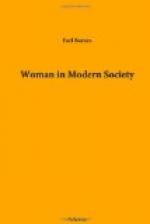In the last place, if the citizen knows what he wants, how to devise the governmental machinery to get it, and how to select the right men to see that it is done, he must register his desire by a vote; and then watch his servant carefully to see if he justifies the trust imposed in him. If he does not, then the citizen must criticise, threaten, and, if necessary, finally dismiss the unfaithful employee. Only one who can fulfil all these functions can be considered a desirable citizen from the point of view of a modern democracy. “Eternal vigilance is the price of liberty.”
And why should one desire to undertake this arduous responsibility? In the first place, because he wants the public work well done, as he understands it; and the only way to have it done in this manner is to attend to it himself. If he does not attend to it, some one else will do so; and if the intelligent citizens do not look after it then the public business will be exploited by individuals, or groups, in their own interest; and, before the citizen realizes what is happening, he will be deprived of that political liberty to secure which millions of men and women have struggled and suffered and even given their lives in the years which lie behind us.
And yet possibly the most important value of participation in political life to-day is the byproduct of continuous education which it gives. Modern political life has probably done more to train the men involved in it than have schools or churches. Business and industries alone might claim to be its rivals. In a despotism, all the events of public life are uncertain and seemingly accidental, depending as they do on the caprice of an individual. This discourages thought among the masses, paralyzes action, and breeds inertia and hopelessness. At best, it gives rise to periods of desperation and violence; at its worst, it gives us the hopeless masses of Mohammedan lands. In a free democracy, on the other hand, those who participate are in a continuous process of education, judging, selecting, willing, and always with regard to realities that affect daily life. Citizenship gives one a continuous laboratory course of training in the art of right living.
Nor can the full value of this continuous training be obtained by the onlooker, no matter how intelligent he may be. For full growth of mind and spirit one must participate; just as in athletics one must leave the spectator’s bench and play the game if one would develop one’s own powers. Participation means love, hate, devotion and sacrifice, and only when all these powers of the soul are brought into play, together with the judgment, is the character strengthened and life more abundantly obtained.




